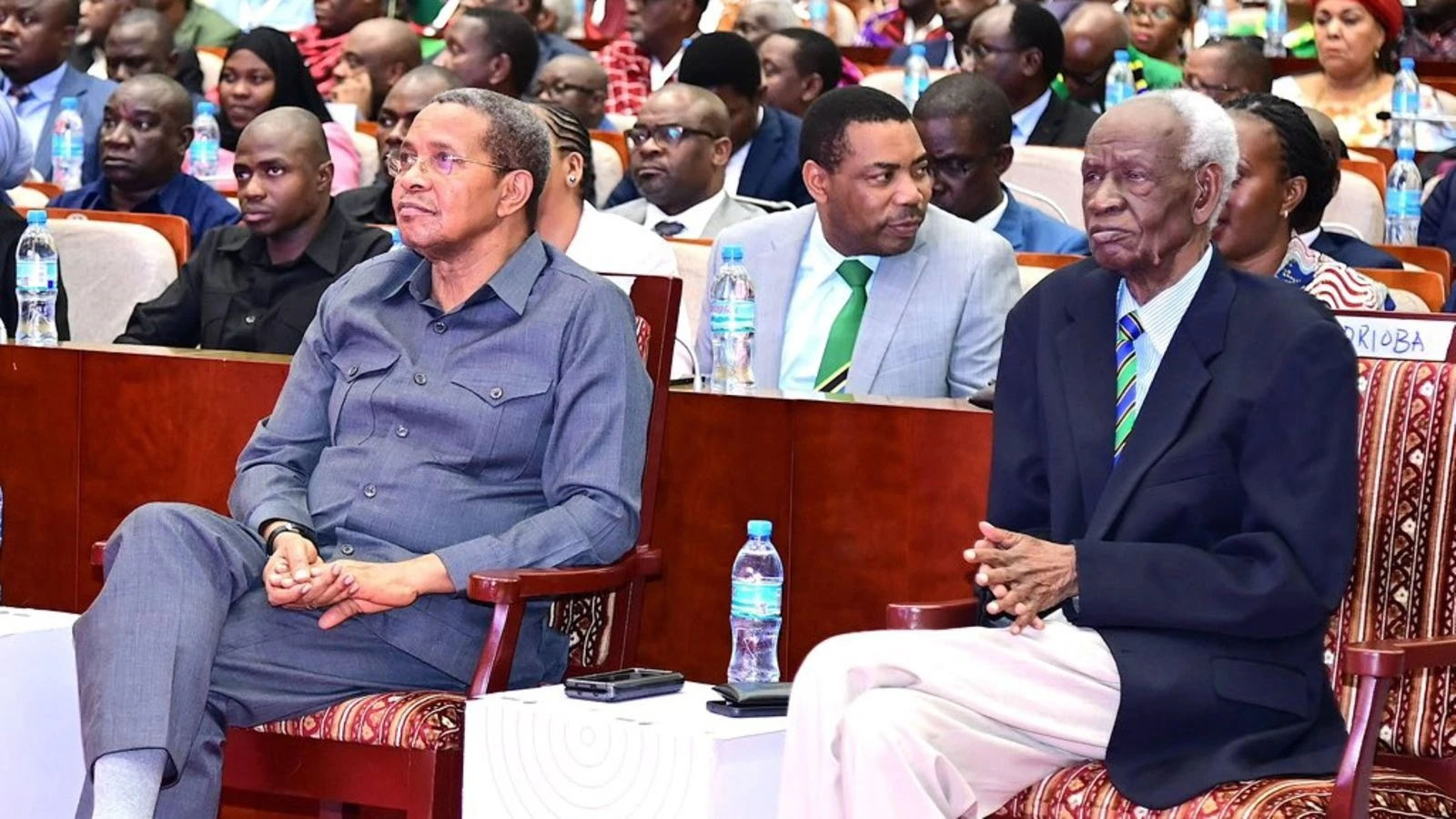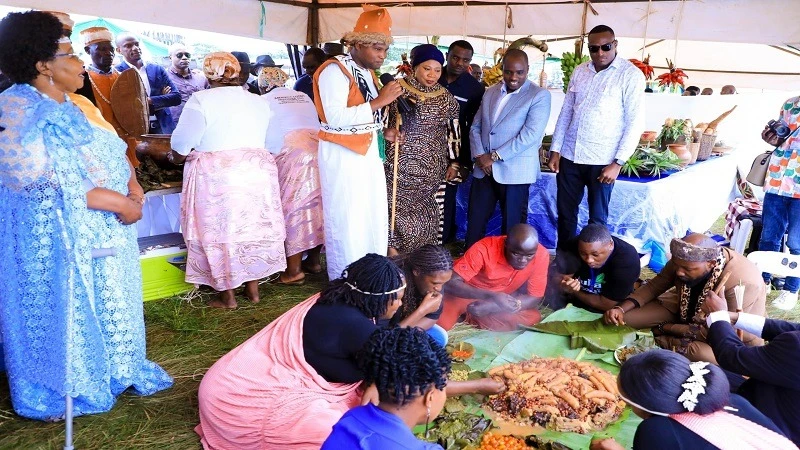Warioba honours Sokoine's legacy at book launch, celebrates integrity and leadership

IN a stirring tribute to the late Edward Moringe Sokoine, former Prime Minister of Tanzania, retired Chief Justice Joseph Sinde Warioba delivered a powerful reflection on the legacy of a man who epitomized integrity, patriotism, and a relentless fight against corruption.
Speaking during the launch of the book ‘Edward Moringe Sokoine: His Life and Leadership’ in Dar es Salaam on September 30, 2024, Warioba described Sokoine as a principled leader who guided Tanzania through some of its most turbulent periods with unparalleled dedication.
Warioba praised Sokoine’s unwavering commitment to Tanzania’s welfare, recalling the key moments when Sokoine stepped up to lead the country during the dissolution of the East African Community (EAC), the formation of Chama Cha Mapinduzi (CCM), and the war between Tanzania and Uganda.
Appointed by then-President Julius Nyerere at the age of 39, Sokoine was a symbol of youthful leadership. His fresh approach ushered in a new era for the Tanzanian cabinet, with many young ministers joining his team. "He was a leader who hated corruption and economic sabotage with a passion," Warioba said, underlining Sokoine’s moral firmness.
However, Warioba did not shy away from revealing the challenges Sokoine faced. Sokoine’s fervor for justice led to the establishment of special courts to tackle economic sabotage, but these swift decisions sometimes stirred controversy.
"Sokoine rejected my advice," Warioba recounted, explaining how he, as Attorney General at the time, was forced to challenge the Prime Minister’s policies, threatening to resign unless changes were made to protect human rights. Despite the clash, Sokoine's leadership prevailed, and with President Nyerere’s intervention, the laws were eventually revised to include provisions for bail, marking a crucial turning point.
Yet, even as Sokoine’s anti-corruption campaign gained momentum, betrayal brewed within his inner circle. Government officials and political allies who once stood beside him began to distance themselves, claiming the Prime Minister had overreached. "Leaders he trusted began blaming the police, claiming the Prime Minister had overstepped," Warioba said, a stark reminder of the loneliness that can accompany true leadership.
Sokoine’s humility was equally remarkable. Despite holding one of the highest offices in the land, he remained deeply connected to his Maasai roots. Warioba fondly recalled visiting Sokoine’s modest home, where he cared for both modern and traditional livestock, symbolizing his refusal to be separated from his cultural heritage. "He didn’t want to separate his modern cows from the traditional ones," Warioba said, reflecting the simplicity and grounded nature of a man who never let power cloud his principles.
Current Tanzanian leaders, notably President Samia Suluhu Hassan, echoed Warioba’s sentiments, urging today’s politicians to follow Sokoine’s example. Speaking at the same event, President Samia stressed the importance of integrity, discipline, and hard work in leadership.
"Edward Sokoine was entrusted with significant responsibilities, including the role of Prime Minister at a young age, due to his loyalty and dedication to his country. His legacy remains a beacon for all leaders," she said.
The President further highlighted Sokoine’s role in pivotal national projects, such as overseeing the construction of the Tazara Railway and advocating for women’s inclusion in the military.
However, as the book on Sokoine’s life was celebrated, it also served as a stark contrast to the leadership many Tanzanians see today. Political analysts have often criticized the current generation of leaders for falling short of the high bar set by figures like Sokoine.
While Sokoine’s leadership was defined by selflessness and a tireless commitment to public service, many modern leaders seem more focused on consolidating power and advancing personal interests. "We no longer see the same integrity in our leaders today," noted political commentator Juma Ngoma. "Sokoine was a man who truly lived for the people, but in today’s political landscape, leaders are quick to abandon the fight against corruption once it threatens their political survival."
In comparison to the youthful leadership Sokoine embodied, current young leaders in Tanzania appear to lack the same fire and vision. Where Sokoine was known for taking bold, decisive actions—even when it was unpopular—today’s politicians often shy away from confronting corruption within their ranks.
"Sokoine had a vision for a clean and just government, but it feels like that vision has been lost," said another political analyst, Dr. Pius Makene. "The young leaders we have today are more interested in maintaining the status quo than challenging the deep-seated issues of corruption and economic sabotage."
Warioba’s reflection and the release of the book serve as a wake-up call to Tanzanian leaders. As Vice President Dr. Philip Mpango, who spearheaded the book’s development, pointed out, Sokoine’s legacy is a crucial resource for future leaders. He urged the government to provide support to retired leaders to document their memoirs while still alive, ensuring that Tanzania’s history is not lost to time.
Behold, Warioba’s heartfelt tribute to Sokoine painted a picture of a leader who was not only fierce in his convictions but also humble in his approach to governance. Sokoine’s legacy remains a masterclass in leadership—one that today's leaders should study closely.
The Minister of State in the President’s Office for Public Service Management and Good Governance George Simbachawene captured it perfectly when he remarked, "Sokoine’s life provides a masterclass in integrity and discipline—qualities that are essential in today’s leadership." Yet, the question of whether today’s leaders can measure up to Sokoine’s towering legacy looms large. Many of them, despite their youthful age, seem unwilling or unable to shoulder the weight of public trust with the same commitment that Sokoine did.
Sokoine's brand of leadership wasn’t merely about occupying a position; it was about embodying the values of service and sacrifice. He fought relentlessly against economic sabotage and corruption, even when it meant clashing with his allies or going against the grain.
His firm stance on justice and accountability, illustrated by his push for special courts to tackle economic crimes, is a far cry from the political maneuvering and backtracking often witnessed today.
When Sokoine faced opposition from those within his inner circle, he didn’t waver. He took principled stands, even at the cost of popularity, unlike some modern politicians who seem more focused on public relations than on making difficult decisions.
Political analysts today lament that the current generation appears more concerned with maintaining political survival than confronting systemic corruption head-on. As Juma Ngoma pointed out, the fire that drove Sokoine’s leadership seems largely absent in the corridors of power today.
Sokoine’s humility, grounded in his Maasai roots, also set him apart. His refusal to separate his modern lifestyle from his traditional one was emblematic of his deep connection to the people. He lived simply, untainted by the trappings of power, while too many of today’s leaders seem far removed from the everyday struggles of ordinary Tanzanians.
The question is not only whether current leaders dare to follow in Sokoine’s footsteps, but whether they have the moral compass to truly serve the nation. With Tanzania at a crossroads, leaders must decide if they will rise to the occasion or remain mired in political self-preservation. The answers will determine if Sokoine's legacy will shine as an unattainable ideal or a guiding light for generations to come.
Top Headlines
© 2024 IPPMEDIA.COM. ALL RIGHTS RESERVED

























